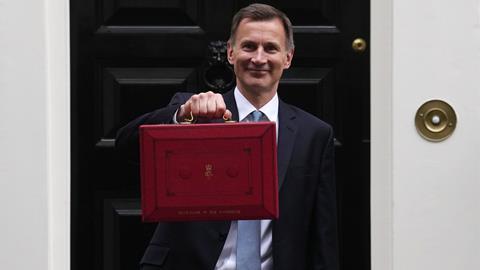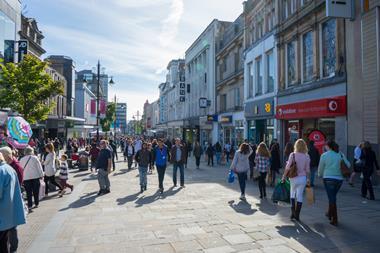A “final nail in the coffin for the high street” was the grim description from a leading property consultancy of today’s autumn statement.
As predicted, Chancellor Jeremy Hunt froze business rates for the fourth year for smaller businesses but not larger ones, meaning they face a 6.62% rise in the tax from next April.
Estimating what that means for individual retailers, the same property consultancy said it would result in increases of £1m for Zara, £6.3m for Next and £10m for M&S.
It was a “massive hit to the high street” and “for some businesses it might be the last straw”, said Colliers head of business rates John Weller.
He was not alone in his conclusion, with BRC CEO Helen Dickinson saying retailers and their customers had been “sold out by the Chancellor’s statement”.
“As we enter the Christmas period, this autumn statement will serve only to renew inflationary pressures that ultimately harm households,” she said.
“The Chancellor has poured fuel on the fire spreading across our high streets with a tax hike on shops and other businesses. His decision to increase the business rates standard multiplier will cost retailers hundreds of millions every year.”
But across the industry reaction to the statement was mixed. So, what else was in it?
A flawed business tax for high streets
The business rates increase “comes at a time when retail sales volumes have hit their lowest level in two years”, continued Dickinson, adding: “This flawed tax continues to wreak havoc on our town and city centres, closing shops and costing jobs.”
However, figures from commercial real estate intelligence firm Altus Group suggested freezing rates again for small business – along with Hunt’s extension of a 75% discount for retail, leisure and hospitality, capped at £110,000 – would save the average shop £11,728 and the average restaurant £16,507. The average pub will save £12,869, whole also benefiting from a freeze in alcohol duty until August 2024.
James Lowman, CEO of the Association of Convenience Stores, said the measures would “help thousands of retailers with the cost of trading during what remains an extremely challenging time”.
“There remain fundamental issues with the business rates system that need to be addressed to provide fairness across the system in the long term, but today’s announcements will provide a much-needed boost to investment,” he said.
Federation of Independent Retailers national president Muntazir Dipoti said: “We are pleased the Chancellor has taken on board our serious concerns about business rates, but our members are still struggling with extortionate energy bills.
“Our costs are rising all the time, and when you factor in the increase in the minimum wage to £11.44 an hour, some small shops will inevitably have to consider whether their businesses are viable and sustainable.
“It was also disappointing that there was no mention of any increase in public spending, especially on policing, at a time when shoplifting and attacks on shop staff have reached epidemic proportions.”
Positive property news
There was more property news, with Hunt moving to speed up planning applications for businesses, which currently take “too long”, he said.
Reforms from next year will allow local authorities to recover from businesses the full cost of major planning applications in return for being required to meet guaranteed faster timelines. Failure to do so will see fees refunded automatically and the application processed free of charge.
UKHospitality CEO Kate Nicholls said it would “drive quicker planning approvals” and “remove a significant barrier to business investment”.
“This type of reform to reward the best-performing local planning authorities is exactly the type of change we have been suggesting to drive growth in hospitality,” she added.
It is also likely to come as a welcome development to the discounters, whose new store openings frequently face lengthy delays at the planning stage.
Cutting taxes on business investment
From a wide business perspective the most welcome news was making existing temporary tax relief on investment permanent – “the biggest business tax cut in modern British history”, according to Hunt.
The Chancellor’s measure is designed to cut the cost for businesses investing in IT equipment, plant and machinery and is “an effective permanent tax cut of £11bn a year”.
“Full expensing”, which means businesses offset the total cost of investment against the tax they pay, was first introduced in the April budget and builds on 2021’s “super deduction”, for which investment was proposed to end in March 2026 but the deadline has now been scrapped.
Hunt said the permanent extension would mean for every million pounds invested, businesses would receive £250k off their tax bill in the same year.
Food & Drink Federation CEO Karen Betts welcomed the move, commenting: “Making full expensing permanent in particular will help to incentivise the investments necessary for companies to innovate and grow, and to continue to provide shoppers with high-quality, nutritious and affordable food and drink.”
Lee Murphy, MD of The Accountancy Partnership, added: ““Making full expensing permanent will allow entrepreneurs to transfer their gaze to growth and reinvestment.
“It means they will be able to have greater scope in improving production and make strides to bolster the bid to improve the economy by implementing this tax break.
“The benefit of full expensing gives entrepreneurs support to allow them to look forward to the future, instead of fighting for survival.”
National living wage raise
From 1 April 2024, the national living wage will increase by 9.8% to £11.44 an hour for eligible workers. For the first time this will also include 21 and 22-year-olds.
Business operators have already raised concerns to The Grocer this could put pressure on their already stretched cost bases.
But it could, coupled with a two percentage point drop in employee National Insurance, also ease the pressure on squeezed consumers and be a boost for spending on everyday essentials, such as groceries.
However, OBR analysis pointed to “financial drag” mitigating the consumer benefits of these measures as more people are dragged into higher tax bands, which have been frozen.
Indeed the OBR forecasts a 3.5% drop in real household disposable income per person between 2019-20 to 2024-25, which remains “the largest reduction in real living standards since ONS records began in the 1950s”.
Lower growth forecasts
While the UK has avoided slipping into a recession this year, sharply reduced economic growth forecasts suggest the UK economy and stretched consumers are likely to remain under pressure in the short and medium term.
The OBR forecasts growth will be 0.6% this year compared to an expected 0.2% drop.
However, that is mitigated by growth next year dropping to 0.7% from 1.8% and to 1.4% in 2025 from an expected 2.5%.
The OBR five-year forecast for GDP growth does not foresee growth topping 2% in any year over that period.




















No comments yet